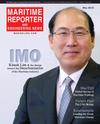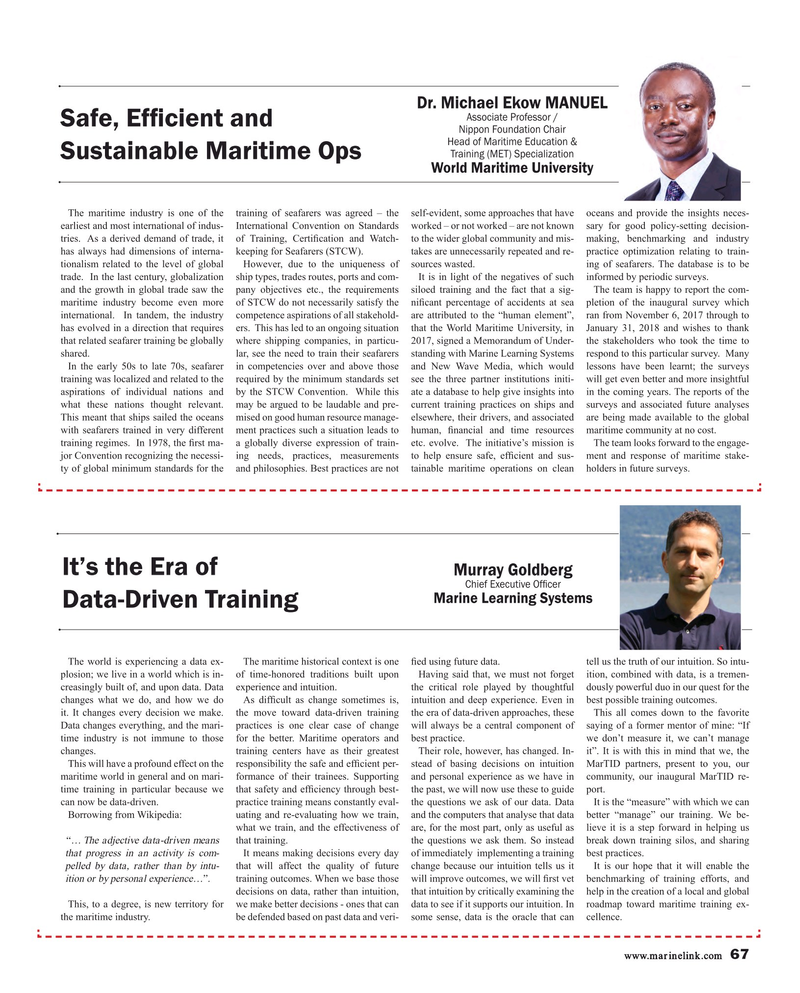
Page 67: of Maritime Reporter Magazine (May 2018)
Marine Propulsion Edition
Read this page in Pdf, Flash or Html5 edition of May 2018 Maritime Reporter Magazine
Dr. Michael Ekow MANUEL
Associate Professor /
Safe, Ef? cient and
Nippon Foundation Chair
Head of Maritime Education &
Training (MET) Specialization
Sustainable Maritime Ops
World Maritime University
The maritime industry is one of the training of seafarers was agreed – the self-evident, some approaches that have oceans and provide the insights neces- earliest and most international of indus- International Convention on Standards worked – or not worked – are not known sary for good policy-setting decision- tries. As a derived demand of trade, it of Training, Certi? cation and Watch- to the wider global community and mis- making, benchmarking and industry has always had dimensions of interna- keeping for Seafarers (STCW). takes are unnecessarily repeated and re- practice optimization relating to train- tionalism related to the level of global However, due to the uniqueness of sources wasted. ing of seafarers. The database is to be trade. In the last century, globalization ship types, trades routes, ports and com- It is in light of the negatives of such informed by periodic surveys. and the growth in global trade saw the pany objectives etc., the requirements siloed training and the fact that a sig- The team is happy to report the com- maritime industry become even more of STCW do not necessarily satisfy the ni? cant percentage of accidents at sea pletion of the inaugural survey which international. In tandem, the industry competence aspirations of all stakehold- are attributed to the “human element”, ran from November 6, 2017 through to has evolved in a direction that requires ers. This has led to an ongoing situation that the World Maritime University, in January 31, 2018 and wishes to thank that related seafarer training be globally where shipping companies, in particu- 2017, signed a Memorandum of Under- the stakeholders who took the time to shared. lar, see the need to train their seafarers standing with Marine Learning Systems respond to this particular survey. Many
In the early 50s to late 70s, seafarer in competencies over and above those and New Wave Media, which would lessons have been learnt; the surveys training was localized and related to the required by the minimum standards set see the three partner institutions initi- will get even better and more insightful aspirations of individual nations and by the STCW Convention. While this ate a database to help give insights into in the coming years. The reports of the what these nations thought relevant. may be argued to be laudable and pre- current training practices on ships and surveys and associated future analyses
This meant that ships sailed the oceans mised on good human resource manage- elsewhere, their drivers, and associated are being made available to the global with seafarers trained in very different ment practices such a situation leads to human, ? nancial and time resources maritime community at no cost.
training regimes. In 1978, the ? rst ma- a globally diverse expression of train- etc. evolve. The initiative’s mission is The team looks forward to the engage- jor Convention recognizing the necessi- ing needs, practices, measurements to help ensure safe, ef? cient and sus- ment and response of maritime stake- ty of global minimum standards for the and philosophies. Best practices are not tainable maritime operations on clean holders in future surveys.
It’s the Era of
Murray Goldberg
Chief Executive Of? cer
Marine Learning Systems
Data-Driven Training
The world is experiencing a data ex- The maritime historical context is one ? ed using future data. tell us the truth of our intuition. So intu- plosion; we live in a world which is in- of time-honored traditions built upon Having said that, we must not forget ition, combined with data, is a tremen- creasingly built of, and upon data. Data experience and intuition. the critical role played by thoughtful dously powerful duo in our quest for the changes what we do, and how we do As dif? cult as change sometimes is, intuition and deep experience. Even in best possible training outcomes.
it. It changes every decision we make. the move toward data-driven training the era of data-driven approaches, these This all comes down to the favorite
Data changes everything, and the mari- practices is one clear case of change will always be a central component of saying of a former mentor of mine: “If time industry is not immune to those for the better. Maritime operators and best practice. we don’t measure it, we can’t manage changes. training centers have as their greatest Their role, however, has changed. In- it”. It is with this in mind that we, the
This will have a profound effect on the responsibility the safe and ef? cient per- stead of basing decisions on intuition MarTID partners, present to you, our maritime world in general and on mari- formance of their trainees. Supporting and personal experience as we have in community, our inaugural MarTID re- time training in particular because we that safety and ef? ciency through best- the past, we will now use these to guide port. can now be data-driven. practice training means constantly eval- the questions we ask of our data. Data It is the “measure” with which we can
Borrowing from Wikipedia: uating and re-evaluating how we train, and the computers that analyse that data better “manage” our training. We be- what we train, and the effectiveness of are, for the most part, only as useful as lieve it is a step forward in helping us “… The adjective data-driven means that training. the questions we ask them. So instead break down training silos, and sharing that progress in an activity is com- It means making decisions every day of immediately implementing a training best practices. pelled by data, rather than by intu- that will affect the quality of future change because our intuition tells us it It is our hope that it will enable the ition or by personal experience…”. training outcomes. When we base those will improve outcomes, we will ? rst vet benchmarking of training efforts, and decisions on data, rather than intuition, that intuition by critically examining the help in the creation of a local and global
This, to a degree, is new territory for we make better decisions - ones that can data to see if it supports our intuition. In roadmap toward maritime training ex- the maritime industry. be defended based on past data and veri- some sense, data is the oracle that can cellence. www.marinelink.com 67
MR #5 (66-74).indd 67 MR #5 (66-74).indd 67 5/7/2018 10:04:19 AM5/7/2018 10:04:19 AM

 66
66

 68
68
